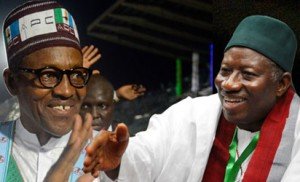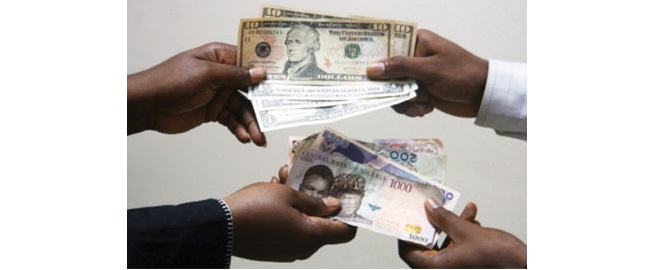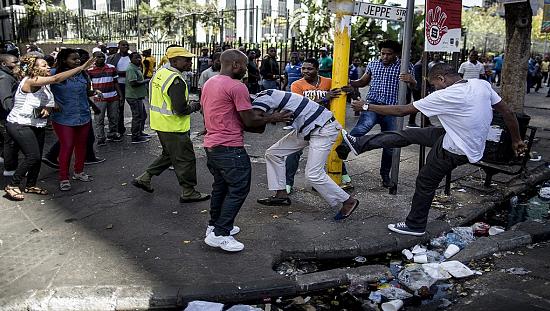There may be 14 presidential candidates for the Nigeria elections, each with their running mate, for the March 28, 2015, presidential election, but the winner is sure to be either of two: incumbent president and PDP candidate Goodluck Jonathan and APC presidential candidate Muhammadu Buhari. There are strong indications that it will be a keen contest. What will determine the winner, however, is the freeness and fairness of the polls as well as the influence of money.
As Eyeway predicted in its maiden print edition (February 1-14), every political party would rig if it could, and the actual voters would be guided more by “stomach infrastructure” and mundane sentiments about tribe and religion.
Last admonition: Please vote for peace and in peace. Do not vent your anger on innocent people, who are poor like you and do not even know the candidates. Let nobody use you to kill and destroy.
Supporters of the two leading candidates have been doing battle in the social and mainstream media, but a large majority of the actual voters have no access to the media. So “Google Square” may not represent “Eagle Square”.
We present two articles written by two campaigners for the presidential candidates, one for Jonathan, the other for Buhari:
***
The North Should Be Patient with Jonathan – Odilim Enwegbara
Obafemi Awolowo was the first Nigerian leader who saw that true federalism should be enshrined in the constitution of this great country, not political federalism with economic centralism. That’s why it baffles me to see that APC having its stronghold in the south-west not only refused to send some delegates to represent the party in the recent national conference, but also has refused to take a definite position on the confab’s report, particularly on whether an APC government is ready to implement one of the most important recommendations of the confab: restructuring Nigeria and making it become a true federal system where political federalism meets fiscal federalism.
Jonathan should be re-elected. I think that rather than vote against Jonathan for fear that he will implement the confab recommendations, the north, being the most endowed economic region in the country, should seek fiscal federalism. With this new arrangement, its vast agricultural and solid minerals sectors should witness surprising investment and growth, making the north not just Nigeria’s food basket but the world’s, just as California is both America’s food basket and the rest of the world’s. In fact, if developed, its vast solid mineral endowment will make northern Nigeria far richer than South Africa, Democratic Republic of Congo and Botswana.
That’s why fiscal federalism and economic regionalism should be pushed by the north the same way the south-west is pushing it. That’s why the north should vote for Jonathan as someone who has finally come up with the best way to engender healthy federalism in Nigeria in a way that promotes growth and economic prosperity. If the north is like that hunter carrying an elephant on the head, it’s ironic that the same north is fighting over its own share of a rabbit with many other hunters.
The Nigerian people should know that there is something very sinister about this ongoing US and UK’s support for Buhari’s presidential ambition. I sincerely believe that we should all know about this game, lest we shoot ourselves in the foot out of our sheer ignorance. Let our leaders know that a leader without superior foreknowledge of events can never be said to be a leader, for the one thing that will separate a leader from the masses is knowledge – knowledge about the game plans of the foreign enemies of Nigeria.
How will today’s leaders want to be remembered? As the ones who, out of ignorance, supervised the fragmentation of Nigeria into four micro-sovereign states the same way Sudan was recently subdivided into Sudan and Southern Sudan? The only way to avert this potential disintegration of our great nation into a pack of micro-states is to use our votes to stop the US from realizing its long-planned agenda of using the 2015 presidential election to begin this process of subdividing Nigeria. Jonathan will only be there for another four years.
My sincere appeal to our patriotic brothers and sisters from the north that fought to keep our great nation one is to be patient and allow Jonathan from the south-south another four years so that, in 2019, power will shift to the north for eight years. I say this because this is a time to pay back the south-south who have remained astute partners of the north both during the Nigerian civil war and the 1979 presidential election when the south-south overwhelmingly voted for Shehu Shagari’s NPN; without that, Awolowo’s UPN would have defeated Shagari in that presidential election.
It is also important for the north to bring out a young and dynamic presidential candidate — from people like Sanusi (Emir of Kano), Tambuwal, el-Rufai, and Ribadu — because the work ahead is huge, challenging and tasking, given that it is almost a 24-hour seven-days-a-week job. Should the northern political elite agree that power should return to the north in 2019, power would subsequently remain eight years in the north.
Enwegbara is a development economist
#
Buhari Is the Kind of Leader We Need – C. Don Adinuba
The All Progressives Congress (APC) presidential candidate in the 2015 general election, Muhammadu Buhari, headed a collegial leadership when he was Nigeria’s military head of state from 1983 to 1985 and chairman of the Petroleum (Special) Trust Fund (PTF) in the late 1990s. Buhari’s deputy, Tunde Idiagbon, was in those days perceived to be so powerful that the military regime was known in the popular media as the Buhari-Idiagbon regime. Almost all major government policies and decisions were announced by Idiagbon, who was the chief of staff at the supreme headquarters.
Contemporary leadership scholars, researchers and practitioners are agreed that the notion that leadership is about one man bestriding the stage like a colossus is old-fashioned and discredited. The notion is known as the messiah syndrome, according to Peter Guy Northouse, author of the famous book, Leadership: Theory and Practice. In place of the one-man hero idea of leadership which is referred to as personality and trait leadership, scholars now canvass what is called distributed or shared leadership. It seeks to bring on board as many people as possible. You can call it democracy in action.
This form of leadership is in line with the current thinking by development experts around the world that the best policies and practices which drive development are the inclusive ones. In 2012, Daron Acemoglu, a distinguished social science professor at MIT, and James Robinson, an eminent scholar at Harvard, published a book entitled Why Nations Fail which brilliantly demonstrates that nations and societies which include as many people as possible in their political and economic processes develop fast while those which exclude their people from deep involvement in their social and economic affairs lag behind.
I have in a recent essay shown that Buhari has a reputation of empowering subordinates, stating that this is a good leadership practice. I cited the instance of Tam David-West, his minister of petroleum resources, who has on occasion stated that Buhari never for once interfered with his work by asking him to employ a particular individual or promote another or assign any a person to certain responsibilities or even to consider a firm for a contract award. He trusted his ministers and other aides, and so gave them a free hand to discharge their responsibilities.
Nigeria is essentially a traditional society, so a number of even professionals and intellectuals are still very conservative, if not out of touch with modern ideas and practice. This is why some of them are in this day and age still critical of Buhari’s shared leadership style, instead of praising it for being superior to some other leadership styles. These are elements still enamoured of the big-man concept, the very leadership disease which has paralysed Africa for several decades.
Rather than make our leaders feel that they are truly the servants of the people, these elements make them feel like lords and conquerors of their own people. Hence, a state governor is not referred to as just a governor but “His Excellency, the “Executive Governor”. The same goes for the local government chairmen who are widely known as “executive chairmen”! Thus, our practice of the presidential constitution, which ordinarily seeks to make top public officers effective leaders, has ended up in Nigeria creating strong men but no strong institutions. Our traditional culture, as though to exacerbate the situation, venerates strong men.
By seeking to paint Buhari as an ineffective leader because he empowered competent subordinates and practised shared leadership as military head of state at a time distributed leadership had not become a popular concept, especially on a continent notorious for absolute dictatorship, the PDP and its operatives have unwittingly portrayed Buhari as a man ahead of his generation. Students, researchers and authors would find Buhari a rewarding study in leadership even in a military regime. He does provide useful management and leadership lessons.
The dangers of the strong-man or messiah syndrome have not always been lost on our people. Joe Garba, as Nigeria’s foreign minister and a member of the supreme military council in the 1970s, had cause to remind the citizens that leadership “is not a one-man show”. If Buhari couldn’t run a “one-man show” as a military dictator, would he do so as a civilian president?
— Adinuba is head of Discovery Public Affairs Consulting.
##














